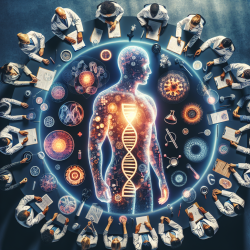Unlocking the Potential: Empowering Practitioners with Data-Driven Insights
As a passionate advocate for children's outcomes, I understand the importance of data-driven decisions in speech-language pathology. The research article titled "What do people need?" offers valuable insights that can empower practitioners to enhance their skills and ultimately improve outcomes for children with rheumatic and musculoskeletal diseases (RMDs).
Understanding the Needs
The research highlights the unmet needs of individuals with RMDs, emphasizing the importance of seeing the person beyond the disease. This perspective is crucial for practitioners, as it encourages a holistic approach to care. The article identifies common barriers to social participation and optimal management of these conditions, such as late diagnosis, stigma, and limited access to care.
Empowering Practitioners
Practitioners can leverage these insights to improve their skills and support their clients more effectively. Here are some key takeaways:
- Early Diagnosis: Emphasize the importance of early diagnosis and intervention to improve long-term outcomes. Educate parents and caregivers about recognizing early signs and symptoms of RMDs.
- Supported Self-Management: Encourage self-management strategies that empower individuals to take control of their health. Provide resources and tools that enable clients to manage their conditions effectively.
- Public Awareness: Advocate for greater public awareness of RMDs and their impact. Collaborate with organizations and communities to reduce stigma and promote understanding.
- Interdisciplinary Collaboration: Work closely with other healthcare professionals to provide comprehensive care. A multidisciplinary approach ensures that all aspects of a child's well-being are addressed.
Encouraging Further Research
While the research provides valuable insights, it also highlights the need for further evidence to determine the efficacy of self-management support for individuals with RMDs. Practitioners are encouraged to contribute to this research agenda by collecting data, sharing experiences, and collaborating with researchers.
Conclusion
By implementing the outcomes of this research, practitioners can enhance their skills and create better outcomes for children with RMDs. The insights provided in the article serve as a foundation for evidence-based practice and encourage a holistic approach to care.
To read the original research paper, please follow this link: What do people need?










